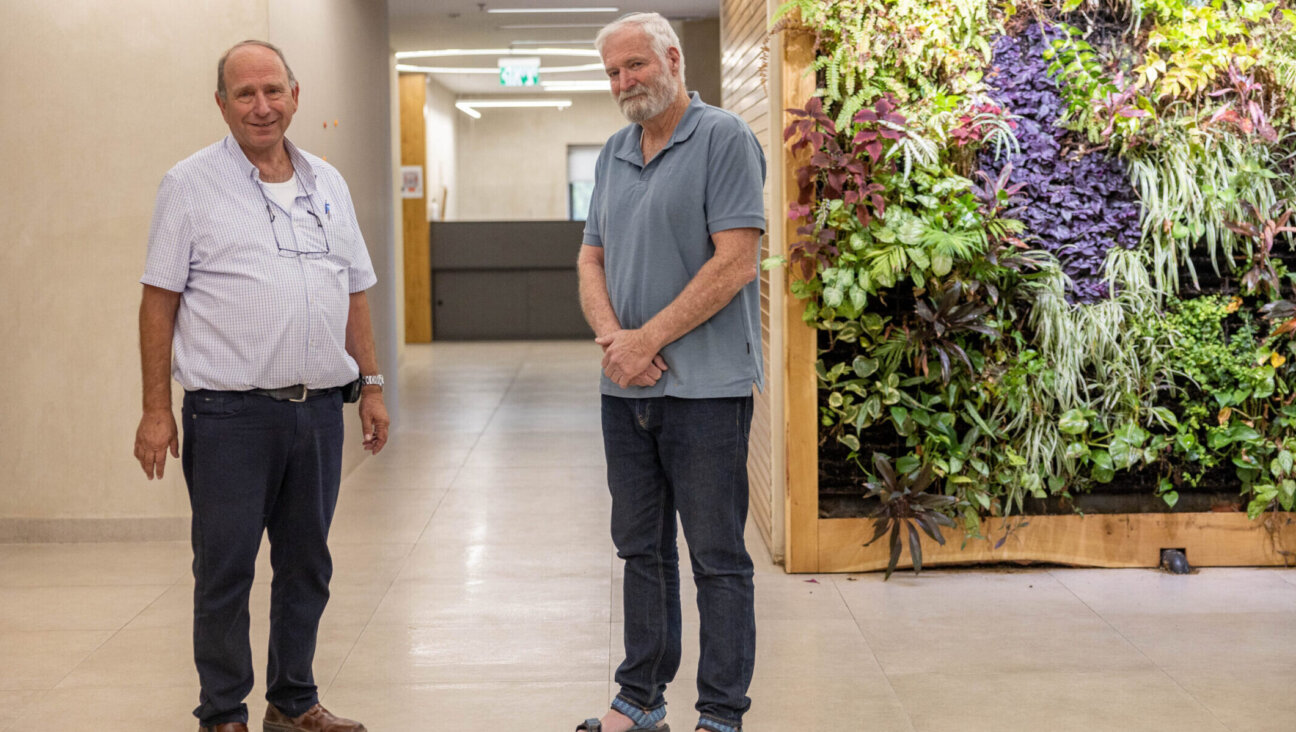December 31, 2004
The Nucleus of Faith Cannot Be Science
In his December 24 opinion column, David Klinghoffer cites the work of physicist Gerald Schroeder as a primary influence behind Antony Flew’s famous turn toward theism (“A Former Atheist Gives Us a Reason To Believe”). Klinghoffer begins with a wonderful statement about Jews being divinely ordained teachers, and then uses Schroeder as the example.
Teachers, especially Jewish teachers, are of course also known for deep disagreements about their subjects. When it comes to the so-called reconciliation of science and Torah, very few scientists are impressed by the arguments of Schroeder, and I imagine theologians are not thrilled either. Schroeder might be a fine teacher, but his attempts to explain Genesis as a rational scientific account of creation have failed. An atheist who finds God through such pseudoscientific illusions may lose his young faith when he learns more about the natural world around him.
Schroeder’s thesis for the reconciliation between scientific and religious explanations of the universe rests on a numerical model, which purports to show that what we see as billions of years of history are somehow just about six days to God, the six days of creation. There is no room in this framework for evolution, which Schroeder dismisses as a scientific chimera. He also attempts to fit earth history into the Genesis framework, revealing a woeful ignorance of geology and paleontology.
As a scientist, I know the futility of trying to use Torah or other sacred texts as scientific blueprints of nature. I applaud Flew’s remarkable journey out of atheism, and I am proud that the Jewish tradition of passionate discourse has been a primary motivation for him. I now hope that he develops a richer and more realistic image of God and the universe.
Mark Wilson
Professor of Geology
The College of Wooster
Wooster, Ohio
At the age of 81, British philosopher and back-sliding atheist Antony Flew has changed his mind and now believes in the intelligent design theory. Well, as an 86-year-old former atheist, I, too, have changed my mind and am now a believer. I believe not in Intelligent Design, but in unintelligent design. The mere fact that more than 99% of all species ever designed by the Creator are extinct, a well-known datum in evolution, and that every human is burdened with a useless appendix and coccyx, proves that our designer was a bungler. Design, sure, but certainly not an intelligent designer.
Norman Fine
Sewell, N.J.
Are Habits That Bad?
In her December 17 opinion column, Bethamie Horowitz asks whether it would “be better to do things out of desire, rather than out of empty habit” (“Is Assimilation That Bad?”). Who is to say that habits are all bad? Ask yourself this as the pilot and crew are going through their checklist to make sure all is working and proper prior to take-off; after a few years, I am sure what they do is by rote. Consider the medical staff scrubbing in and observing sterile procedure prior to surgery. Sometimes following procedure and habit can be lifesaving. How about a teacher that follows curriculum guidelines? Would it not be easier to just hand the kids a Game boy and say enjoy?
Horowitz offers as an example a woman named Sharon. She was in the hospital and her friends brought her nonkosher food, so she stops being kosher. How good of friends were these that did not know she kept kosher? If I am sent a food gift by a client or anyone else that is not kosher, I give it to someone else. Or, I politely say that I appreciate the thought, but I keep kosher. Most people understand.
If I attend a luncheon or a meeting, I make it my business to find out what will be served, and I make a similar dish to bring with me. My no-kosher friends usually stop off at the kosher deli and pick up a sandwich for me if I will be visiting.
Is it better to do things out of desire? That attitude has given rise to many spoiled kids. How about not desiring to pay your bills? You might say, “But those things have consequences.” Perhaps only doing what feels good and what we desire also has consequences — like losing our identity.
I have always believed that no one died and left me in charge of judging anyone. However, in my opinion, you have to understand that to be in the tribe, you have to adhere to rules and expectations. And even though I might drive 80 miles per hour in a 65 miles-per-hour zone, if a cop stops me, I know I have done the wrong thing. People are going to do what they want, but to say there is no need for a guideline or for rules on what is expected….
If we leave our existence up to desire and to what feels good, we will not have Judaism; we will end up with chaos.
Etta Korenman
Fort Worth, Texas
‘Seinfeld’: The Latest ‘Breakthrough’ Series
The accolades given to the “Seinfeld” television show wouldn’t be so bad had I not read the same thing regarding too many television comedies of the past (“Breaking the Mold of the Sitcom,” December 24). “Breakthrough” series included “All in the Family,” “Mary Tyler Moore,” “MASH,” “Mary Hartman, Mary Hartman” “Soap,” “Will & Grace,” “Roseanne” and a few others that dealt with material in a way that had “never” been done before. Billed as the show “about nothing,” it is amazing that the Forward can pinpoint “the ingenious interweaving of plots around a central theme” as the outstanding characteristic of “Seinfeld.” Perhaps the viewing public saw themselves in the self-centered, trivia-obsessed characters, but trying to critique situation comedies is like finding the symbolism in the latest issue of Mad magazine.
Arthur Greebler
Little Neck, N.Y.
Mediators Stay Neutral
I must correct a false impression that a December 17 article on custody cases created in referring to “evaluators and mediators who are supposed to offer unbiased testimony” (“Mothers Push Reforms in Family Courts’ Handling of Custody Cases”).
It is indeed evaluators’ job to offer opinions about cases to courts. By contrast, the two most fundamental principles of mediation are neutrality and confidentiality. As president of a statewide mediation organization, I’ve spoken with many fellow mediators about our role vis-à-vis the courts. Everyone with whom I’ve discussed this uses a confidentiality clause, which insures that the mediator will not testify or submit notes to any court. In fact, it is well understood that mediation would be almost impossible to conduct without the protections of neutrality and confidentiality, as the process requires frank discussion of matters that parties would not speak openly about if their conversations, or the mediator’s resulting opinions, could be reported to the courts.
Further, evaluators are usually court appointed, whereas in most jurisdictions, including New York City, where I practice, mediators are chosen privately by the parties. In those jurisdictions, the article’s concerns regarding hidden relationships between judges and evaluators could not in any way apply to mediators.
Glenn Dornfeld
President
New York State Council on Divorce Mediation
New York, N.Y.
The Right To Offend
Opinion writer David Twersky defends litigation against Christmas Nativity scenes and songs in schools as if this were a bedrock Jewish ideal (“A Lesson in American Civics,” December 17). He uses an example of a caller to Bill O’Reilly’s talk radio show to offer a lesson in American civics and to amplify his belief that Jews justifiably are deeply offended over the joy of Christians in the Christmas season.
Personally, I have no complaint against Christians celebrating Christmas. The real civics lesson that needs to be learned in our own Jewish community is the lesson of religious freedom and tolerance. It strains credulity to insist that people are sincerely overwhelmed if they hear “Silent Night” in a school auditorium or see a sign that says “Merry Christmas.” I am embarrassed that in the face of so little provocation, Jews write letters explaining that “American Jews are Americans” — as if some radio host somehow believes otherwise and the right to not be offended were in the Constitution.
Twersky’s distillation of the “American discussion” about religion and state is that government, in all its manifestations, must bar all expressions with religious content, since any expression inevitably will show favoritism. This is nonsense.
It is impossible to understand how one can stridently defend goose stepping American neo-Nazis marching in Skokie, Ill., yet be strongly opposed to small children singing a Christmas carol. The moral credentials of our community suffer when our intolerance for Christians is greater than our willingness to joyfully express our own religious traditions.
David Friedman
Bethesda, Md.
Please address letters intended for publication to the editor of the Forward, 45 East 33rd Street, New York, NY 10016, and provide your name, address and telephone number. Letters may be wired via fax to (212) 447-6406 or via electronic mail to [email protected] (please include street address in e-mails). Shorter letters stand a better chance of being printed. Letters may be edited for space and style.
A message from our CEO & publisher Rachel Fishman Feddersen

I hope you appreciated this article. Before you go, I’d like to ask you to please support the Forward’s award-winning, nonprofit journalism during this critical time.
We’ve set a goal to raise $260,000 by December 31. That’s an ambitious goal, but one that will give us the resources we need to invest in the high quality news, opinion, analysis and cultural coverage that isn’t available anywhere else.
If you feel inspired to make an impact, now is the time to give something back. Join us as a member at your most generous level.
— Rachel Fishman Feddersen, Publisher and CEO























